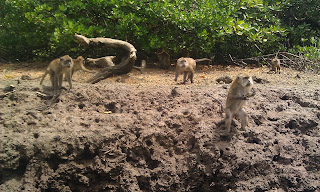Tears of my Beloved
by
Farhad Khadim
I undertook a journey
Back in time
To meet my Beloved
To tell him of my hurt
Of the wounds they inflict on him
The lies they tell; the hatred they feel
Of the rage inside me
When they hurl insults at him.
I found him in the Lighted City
Between two mountain tracts
He was sitting
In the shade of his mosque
Serene and composed
A playful smile on his face
A King with no throne
A Master with no servant
Alone with His Lord
The weapon of his choice
"Assalaamu Alaika! Ya Rasulallah"
He raised his sublime face
As I approached
Stood up and embraced me
My heart melted as
Time stood still
And the distance of centuries
Disappeared
As if they were a fleeting moment
The moment lingered for centuries
And a strange feeling of peace
Engulfed me
Like the early morning fog
That fills the mountain pass.
Do they know me, he asked
His words soft and steady
Have you told them
Of Quraish and its leaders
Steeped in arrogance and disbelief
Their disdain for Bilal
And the freedom he sought?
Do they know of Khadija, Fatima and Khansaa
And the lovely Aisha in whose lap I lay my head
When the call came for me to return?
Have they seen the Ka'bah
Free of idols?
Restored to the purity
of Abraham's time?
Have they heard of Khalid, Ali and Umar
And the gracious AbuBakr
Whose heart was made of gold?
Have they heard of Taif
And the bands of men
Who answered my call
With stones and sticks?
Do they know of my refuge
Within the garden's walls
And the curiosity of Addas
Who embraced my call?
Have they heard of Mu'tim
And his chivalrous stand
Against Quraish
While he was one of them?
I shifted my feet
As my Beloved looked at me
With pity in his eyes and kindness on his face
I knew that I had let him down
Failed to speak of him
Let the world know of
The man who came as a Mercy
And what is my Ummah doing, he inquired
When they throw insults at me?
My eyes lit up, now is the time
To tell him of our courage, our loyalty
We march, I said, in hundreds of thousands
Chant slogans in your defence
We take to the streets and vent our outrage
At the ridicule they’ve heaped on you
We care not for their lives, nor their innocence
They are all one, united in torment!
The Prophet lowered his head
A veil of sadness crossed his face
I looked into his eyes, filled with tears
And knew that I had made a terrible mistake
My brother, he said
This is not the way
I have endured worse
At the hands of Quraysh
And the hypocrites have plotted
Day and night
To make me fail in my resolve
Go tell my people
That kindness and compassion
Conquers
That their love for me is best displayed
When they tell the world about me
When they walk in my footsteps
Living like I did
In their hours of sleep and wake
When knowledge of me
Reaches every household
And the words of the Qur'an
Are recited ever so softly at dawn
When Addas and Mu'tim
Will rise again
To witness and to protect
And when my prayer at Taif
Is on the lips of everyone:
"O Allah! I complain to You
of my weakness, my scarcity of resources
and the humiliation I have been subjected to by the people.
O Most Merciful of those who are merciful.
O Lord of the weak and my Lord too.
To whom have you entrusted me?
To a distant person who receives me with hostility?
Or to an enemy to whom you have granted authority over my affair?
So long as You are not angry with me, I do not care.
Your favor is of a more expansive relief to me.
I seek refuge in the light of Your Face by which all darkness is dispelled
and every affair of this world and the next is set right,
lest Your anger or Your displeasure descends upon me.
I desire Your pleasure and satisfaction until You are pleased.
There is no power and no might except by You."









